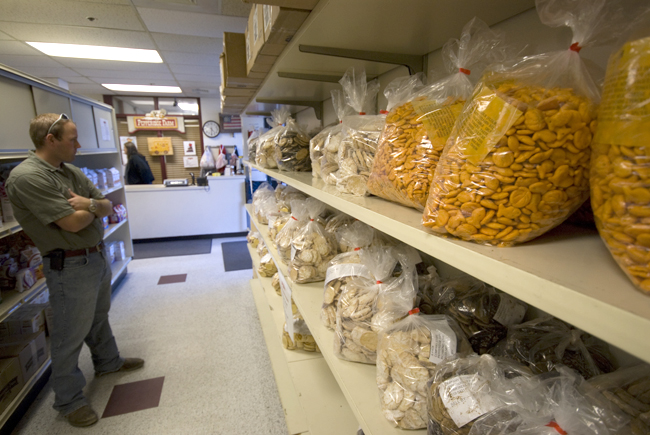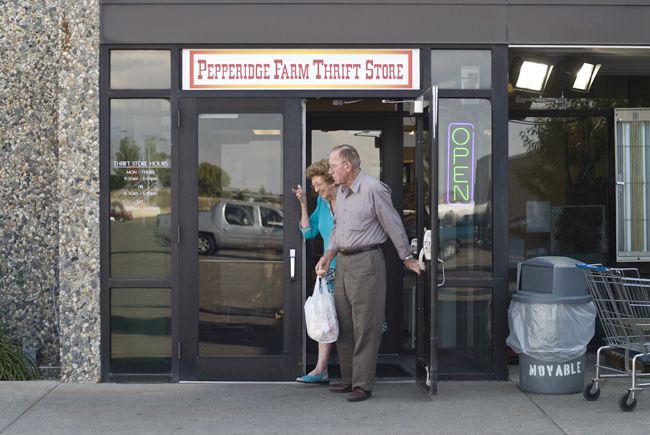Cookies, bread and goldfish … Oh my!
Pepperidge Farm has been making cookies long before any of the students at Utah State could eat them.
The company originated in 1939 and was formed by Margaret Rudkin, a Connecticut wife and mother. Pepperidge Farm was acquired by Campbell Soup in 1961.
Thirteen years later, the Pepperidge Farm plant in Richmond, Utah, was built, serving cookies to the entire West Coast.
Pepperidge Farm has had bragging rights for many years as making cookies of distinction. The plant in Richmond, which sits on 463 acres, is one of eight nationwide and the only one serving Utah and the West Coast states with cookies and the entire nation with frozen bread products.
Rodney Meppen, plant controller, said they currently have about 390 employees. He said the employees do various things from making the products to packaging and distributing to working in the cafeteria.
The Richmond plant makes five different kinds of bread: garlic, Parmesan, five cheese, mozzarella and plain French bread.
Along with their frozen bread line they make frozen cinnamon rolls. They also produce goldfish and the varieties of cookies, including the original premium cookie, the Milano.
Meppen said fall tends to be the plant’s busiest time of the year because they are preparing for the holiday rush.
Human resource director David Bryan said the factory has one line devoted to the packaging and distributing of their holiday selections.
According to Bryan, they gift package a lot of their cookies into assortments specifically for the holidays. He said the holiday rush will be over by mid-October because that is when the last holiday packages are distributed.
Meppen said outside of the holiday season the factory constantly has six main assembly lines going: two for cookies, two for goldfish, one for bread and one for assortment.
The particular type of cookie the factory is making on a given day depends on the demand.
However, the numbers stay roughly the same, producing approximately 2 million cookies every day and more than 69 million goldfish. Summed up, this means that Pepperidge Farm distributes more than 4 million cases per year. They also distribute more than two million cases of frozen products he said.
According to Meppen, many cookies are prone to breakage and coming out distorted on the line.
“It’s the responsibility of every employee to make sure that our products are of the highest quality out the door,” he said.
Meppen said if an employee sees something wrong with a cookie, he pulls it off of the line, puts it on a tray and then those cookies are bagged and taken to the thrift store. He said the number one complaint of customers is cookie breakage, which is most evident in cookies with nuts.
Bryan said the thrift store is where Pepperidge Farm sells fresh and second products at a reduced price to the general public.
“The thrift store gives us the opportunity to run our excess cookies directly off of the line, thanks to our distributors,” Bryan said.
However useful the thrift store is, it is not an aspect of the company that Pepperidge Farm would like to keep, Meppen said.
“Our goal is to put the thrift store out of business, to send first products to our (buyers),” he said.
Bryan noted how hard-working his employees are and that the student population at USU is a big contributor.
“The thing that gives me the most pride is brand recognition. Our employees work hard in the plant and help us to get recognized in the community. So many are very involved in the community,” he said. “It’s phenomenal the things that they do after completing all that we ask of them here.”
Bryan said the thrift store has its advantages for both Campbell Soup, who owns Pepperidge Farm, and the public, especially students with shallow pockets.
Bryan also said it helps the company because it helps them to get their variety in products known and helps students and the larger public to enjoy high quality cookies and breads at a discounted price.
“I really like the people I work with and working with the public is always good,” said Jill Feller, who has worked with the company for eight years. “It’s a good job. I work part time, it’s close to home and it pays well.”
The thrift store sells the aforementioned products as well as T-shirts, ball caps and other gear with the Pepperidge Farm logo.
A sample table is also set up to allow customers to try the various cookies and crackers that Pepperidge Farm has to offer.
The thrift store is open Monday–Thursday from 9:30 a.m – 6:00 p.m, Friday 6:30 a.m. – 6 p.m. and Saturday 10 a.m. – 4 p.m.
–beck.turner@aggiemail.usu.edu

A customer searches a selection of cookies at the Pepperidge Farm thrift store in Richmond. The thrift store is one of eight stores spread across the nation. (Tyler Larson)

